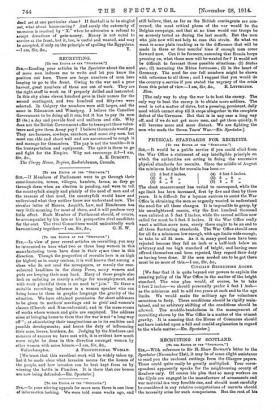PHYSICAL STANDARDS FOR RECRUITS.
[To THZ EDITOR OF TEl " STECTATOR."1 SIR,—It would be a public service if you .could elicit from the War Office a statement of any intelligible principle on which the authorities are acting in fixing the successive physical standards for recruits. Since the middle of August the minimum height for recruits has been :- (1) 5 feet 2 inches. (4) 5 feet 5 inches.
(2) 6 3 (5) 5» 4 (3) 5 6 (6) 5 „ 3
The chest measurement has varied to correspond, while the age limit has been increased, first by five and then by three years. It is difficult for a layman anxious to assist the War Office in obtaining the men so urgently wanted to understand the need for all these changes. It is impossible to grasp, by his unenlightened reason, why the first hundred thousand were enlisted at 5 feet 2 inches, while the second million now called for must be 5 feet 3 inches. If the War Office really want a million more men, surely there ought to be an end to all these fluctuating standards. The War Office should once for all fix a minimum low enough, with age limits wide enough, to take in all fit men. As it is, many good men have been rejected because they fell an inch or a half-inch below an arbitrary and too high standard of height, and having once offered themselves and been rejected, they regard their duty as having been done. If the men needed are to be got there must be no more of this.—I am, Sir, &c.,
CIVILIAN RECRUITING AGENT.
[We fear that it is quite beyond our powers to explain the amazing policy of the War Office in the matter of the height standard. The wise plan would, of course, be to take 5 feet 2 inches—we should personally prefer 5 feet 1 inch— as the minimum and to add two years at each end to the age limits. We would make the military age for volunteers seventeen to forty. These conditions should be rigidly main- tained, and no arbitrary shifting of the conditions should be allowed. The muddle-headedness in the management of recruiting shown by the War Office is a matter of the utmost gravity. It is amazing that the House of Commons should not have insisted upon a full and candid explanation in regard to the whole matter.—ED. Spectator.]










































 Previous page
Previous page